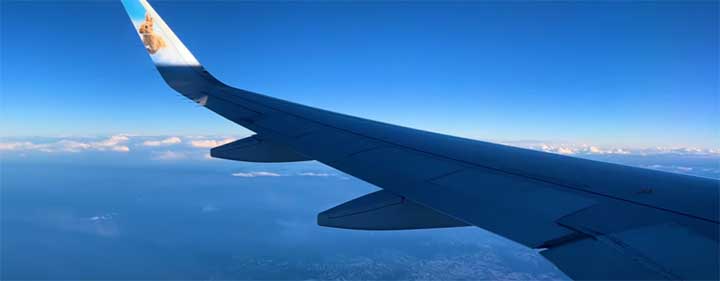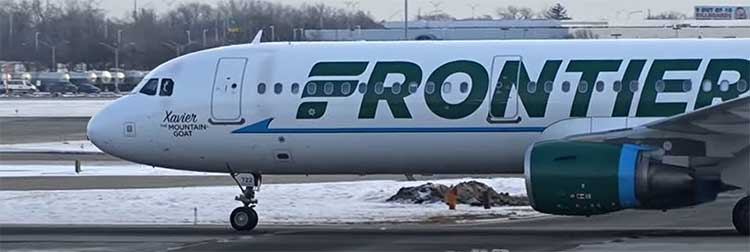Frontier Airlines is known for having some of the cheapest airfares around. But how does Frontier manage to offer such low fares and still operate as a successful business?
There are several factors that allow Frontier to keep its costs down and pass the savings on to customers.
Reasons For Frontier Airlines Being So Cheap
These are the reasons why this airline is so affordable:
- Focus on Secondary Airports
- Charging for Extra Services.
- High Aircraft Utilization Rates
- No Frills Inflight Experience
- Use of Cookie-Cutter Aircraft
- Aggressive Cost Cutting
- Use of Discount Travel Sites
- Strong Ancillary Revenue
Let’s analyze them in detail for a better understanding.
- Focus on Secondary Airports

One of Frontier’s main strategies is to focus on flying out of secondary airports in major metro areas instead of the main international airports. For example, in the Denver area Frontier utilizes Denver International Airport as well as Colorado Springs Airport.
In Chicago, Frontier flies out of O’Hare as well as Midway. And in Atlanta, Frontier uses Hartsfield-Jackson and Atlanta Northwest Arkansas Regional Airport.
Secondary airports have lower operating costs for airlines because they tend to be less congested so planes can take off and land quicker. There are also lower gate fees and landing fees charged by the airport.
Additionally, fewer flights mean less competition for gate space. By largely avoiding high-traffic major airports, Frontier is able to significantly reduce its airport operation expenses.
- Charging for Extra Services
Another way Frontier keeps fares low is by charging additional fees for services and amenities that used to be included in the airfare. This unbundling of services allows customers to pay only for what they want.
Services like checked baggage, seat selection, snacks, drinks and itinerary changes can add anywhere from $50 to $150+ roundtrip to the base fare.
While these fees seem high, the tradeoff is a rock-bottom base fare that makes flying accessible to budget-conscious travelers.
Frontier also uses the fees to incentivize customers to book directly on their website, as many ancillary fees are cheaper when purchased during web ticket booking versus at the airport. This ensures Frontier captures as much ancillary revenue as possible.
- High Aircraft Utilization Rates
An airline makes money when its planes are in the air carrying paying passengers. By minimizing the amount of time aircraft spend on the ground, airlines can operate with fewer planes and keep costs down.
Frontier maintains high aircraft utilization rates in a few key ways. The carrier uses similar aircraft models across its fleet, ensuring mechanics and crew are familiar with all of Frontier’s planes.
Their network is focused on point-to-point routes, which allows for quick turnaround times of just 20-30 minutes between flights. Frontier also operates red-eye overnight flights to make full use of planes.
- No Frills Inflight Experience
Many low cost carriers keep prices affordable by offering a basic economy inflight experience. Frontier has stripped away amenities such as complimentary beverage and snack service, seatback TVs, magazines, and blankets.
While some passengers find this inconvenient, others appreciate the choice of paying only for the services they actually want. For example, Frontier offers on-demand movies available to stream to your own device for a small rental fee.
The no frills experience also extends to Frontier’s aircraft interiors which have minimum padding in seats and no headrests. The lack of heavier amenities like seatback screens help keep fuel usage and aircraft weight down.
- Use of Cookie-Cutter Aircraft

Operating a uniform all-Airbus fleet of A320 family aircraft enables Frontier to streamline its maintenance operations. Mechanics and ground crew only need knowledge of 1-2 aircraft types rather than multiple types from different manufacturers.
Having consistent aircraft also allows for schedule predictability and flexibility since any plane can fly any route.
The A320 models are extremely reliable narrow-body jets that are cost-efficient to operate mainly on short-haul point-to-point routes. With a single fleet type, Frontier can buy spare parts in bulk for cheaper and have all mechanics and hangars specialized to service only Airbus planes.
- Aggressive Cost Cutting
Frontier has a relentless focus on controlling expenses throughout the organization. The airline frequently analyzes processes to remove waste and redundancies. Frontier was an early pioneer of charging for beverages and snacks that used to be complimentary.
They’ve gradually reduced legroom space to the FAA minimum of 28 inches so they can squeeze more seats onto planes.
Employee wages and benefits have also been reduced to minimal levels. Customer service is outsourced to call centers in India and the Philippines to save on labor costs.
With a lean operation, Frontier can profitability offer airfares up to 40% cheaper than legacy airlines.
- Use of Discount Travel Sites
Many passengers check sites like Expedia first when searching for cheap plane tickets. Frontier works closely with discount travel sites to offer exclusive low fares not available on their website.
This opens up Frontier to an enormous customer base of savvy bargain hunters.
However, travelers do need to read the fine print when booking through third parties. Additional passenger fees are often higher when purchased through online agencies versus Frontier’s website. But for the most cost-conscious flyers, the rock bottom airfare is worth the extra fees.
- Strong Ancillary Revenue
Today’s airlines rely on more than just base fares to make a profit – ancillary revenue has become crucial. This includes revenue from baggage fees, seat selection upsells, onboard food/beverage sales, change/cancellation fees, and much more. Ancillary revenue helps offset low base fares.
Frontier has become a master of maximizing ancillary revenue. In 2020, Frontier made $81 of ancillary revenue per passenger. That’s the highest of any US airline and more than 2.5 times the industry average.
These ancillary fees allow Frontier to operate sustainably even with some of the cheapest fares in the industry.
Why You Get What You Pay For With Ultra Low Fares

While tempting, Frontier’s rock bottom ticket prices do come with some downsides customers should be aware of. There are good reasons you generally find much cheaper prices on Frontier versus other airlines.
- No Frills Service and Comfort
Frontier makes no apologies for offering a basic, low cost travel experience. Comfort and service are sacrificed to offer bare bones transportation from point A to B. Seats are cramped with minimal padding and recline.
Don’t expect any free snacks or drinks on board. Entertain yourself on your phone or tablet. And bring your own headphones if you want to enjoy Frontier’s pay-as-you-go in-flight entertainment.
For some passengers, especially shorter flights under 3 hours, the no frills experience is no big deal. But taller travelers or those who desire more amenities are often disappointed. Just make sure to pack your own water, snacks, headphones and neck pillow to stay comfortable.
- Baggage Fees Add Up Quickly
Those rock bottom base fares never actually end up being the final price you pay. With Spirit and Frontier, all the extras – baggage, seat assignments, snacks/drinks, changes etc – get tacked on with hefty fees.
Checked bags start at $40 each way when pre-paid online. Choose your seat assignment? That’ll be $8-$50 each way depending on legroom space. Once you add on a few of these extras each way, you can easily double the base fare costs.
Savvy flyers who carefully avoid all the extras can still get an amazing deal. But the total vacation costs add up quick for families who need multiple big checked bags and seats together.
- Prone to Delays
According to DOT statistics, Frontier has one of the higher flight delay rates in the industry – about 1 in 5 flights are delayed. This is because Frontier schedules very quick turnaround times between flights which leaves little recovery gap. A single delay early in the day cascades throughout the entire schedule.
Passengers with tight itineraries or connections should avoid booking with Frontier. Their network relies heavily on point-to-point direct flights.
So when there is a delay or cancellation, the next available flight with space could be 24 hours later. Definitely consider travel insurance when flying Frontier.
- Very Limited Route Network
Frontier serves under 100 destinations, primarily in the U.S., Mexico and Caribbean. This is far fewer routes than most major airlines. So while you can score cheap Frontier flights to popular vacation spots, their limited network won’t get you everywhere.
If your travels require flexibility or cover multiple destinations, you’re better off choosing an airline with a more extensive network like Southwest, American or Delta. Frontier is best for direct trips to certain leisure hot spots, not multi-stop business itineraries.
- Beware the Cramped Cabin
One inch might not seem like much, but when it comes to airline seat width it’s a big difference. At just 18 inches, Frontier has the narrowest coach seats of any U.S. carrier. Delta and JetBlue have over an inch more width at around 19-20 inches.
Frontier’s Airbus 320 jets are configured as densely as possible with up to 240 seats. So you’ll be wedged tight between fellow passengers with little personal space. Again, for short hops under 3 hours the cramped space might be bearable.
But transcontinental journeys in a narrow Frontier seat can be downright painful.
Also Read: This Is Why SAS Airlines So Cheap.
- Checking a Bag Will Cost You
Frontier loves to tout their $20-$30 fares in ads. But by the time you select a seat and add at least 1 checked bag, that $20-$30 fare quickly doubles or triples. Frontier charges $40-$70 each way for checked luggage depending on when you pay.
Carry-on bags cost $70 if you wait to pre-pay at the airport. So a couple traveling together would spend $160 roundtrip just to check two 50 lb bags.
Most other airlines include at least one free checked bag these days. And basic economy fares on United or American might cost $60 more than Frontier upfront, but include a free bag – making them the same net cost.
For solo travelers who can get by with just a small personal underseat bag, Frontier’s low fares make sense. But for vacationers with multiple large suitcases, other airlines can be cheaper once you calculate baggage fees.
- No Leeway for Changes or Cancellations
Frontier offers some of the least flexible fares in the industry. Changes or cancellations made more than 90 days before departure cost $99 per segment.
Inside of 90 days, changes cost $199 per segment. Any changes within 60 days of departure result in the forfeiture of 100% of the ticket cost.
So if plans change last minute, you can easily lose hundreds of dollars with Frontier. Most other airlines will at least provide flight credit for cancellations. Frontier tickets are use it or lose it.
Their strict change fees ensure the airline minimizes lost revenue. But it leaves passengers with little leeway if plans need to shift.
- Bare Bones Frequent Flyer Program
Loyalty programs are meant to entice travelers to stick with a single airline in exchange for elite perks and rewards. But Frontier’s frequent flyer program offers very little to get excited about.
You don’t earn miles that can be redeemed for free Frontier flights. Instead, you earn points only redeemable for discount vouchers on future travel. It takes 40,000 points to earn a $100 voucher – equivalent to flying 8 roundtrips.
Even their status tiers don’t offer great benefits like free checked bags, upgrades or lounge access.
Unless you live in Denver and fly them constantly, you’re better off sticking to national carriers with more rewarding loyalty programs.
Also Read: Reasons For Spirit Airlines Being Affordable.
Frequently Asked Questions On Flying Frontier
Let’s cover some common questions about Frontier Airlines:
1. Lots of extra fees – bags, seat assignments, changes, snacks etc
2. Frequently delayed flights
3. Very cramped seating with less than 18″ width
4. Limited route network focused on leisure destinations
5. Poor frequent flyer program with minimal rewards
Frontier faces more operational challenges than other major airlines. With quick turnaround times and delays rippling through the system, Frontier has one of the lowest on-time performance records at under 80%. And a single aircraft type fleet gives them little flexibility when delays or cancellations happen.
You may want to avoid Frontier if:
1. You need flexibility to change dates, especially close to departure
2. You need to check multiple bags
3. You desire extra comfort like more seat width, legroom and amenities
4. You have elite status/miles with another airline’s program
5. You frequently fly to smaller markets not served by Frontier
Frontier and Spirit are extremely similar ultra low cost airlines. Both strip away amenities to offer base fares $20-$60 cheaper than major airlines. Spirit has more cramped “pretzel style” seats, while Frontier offers inches more width. Overall luggage allowances are mostly identical. Reliability, fees and route maps are comparable. Either airline can be a good option for bargain seekers able to pack light and avoid lots of extras.
The Bottom Line
The bottom line is that Frontier offers absurdly cheap base fares by cutting every corner possible. You’ll need to be flexible, travel light and avoid fees for changes.
But if you can travel like the pros and plan your vacation strategically, Frontier remains one of the best ways to save 50% or more on airfare costs. Just know what you’re sacrificing for those ultra low fares.

